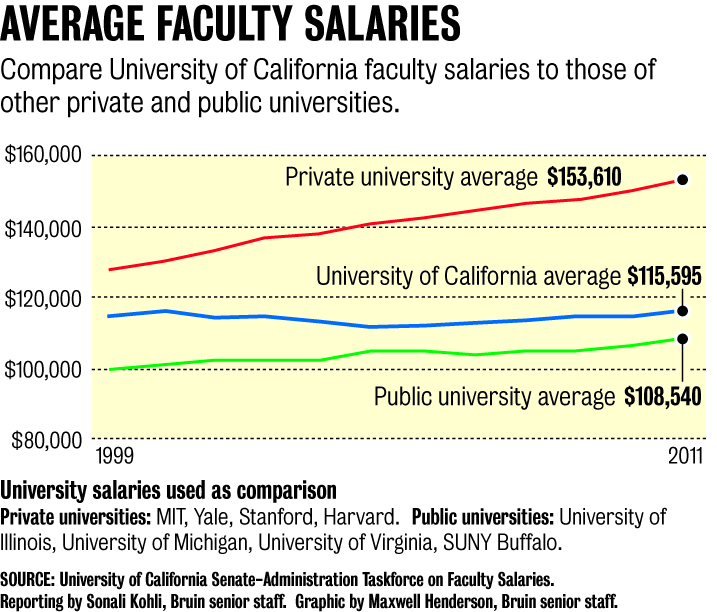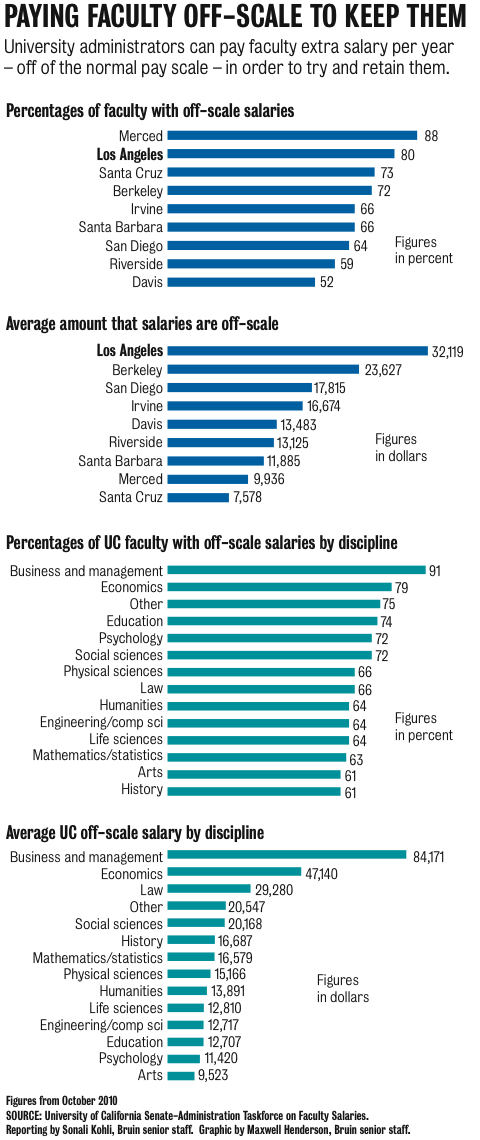
Correction: The original version of the graphic “Average Faculty Salaries” contained an error. The average UC salary is $115,595.
Faculty members at UCLA are currently reviewing a recommendation that may lead to faculty being paid more over a longer period of time.
Under the proposed system, every time a faculty member is promoted to a higher rank, the university would pay them at least the average of what everyone else at that rank is receiving.
Right now, the amount of money each faculty member gets paid is based on a set of steps the University of California has set.
There is a peer review system, which determines whether a faculty member deserves to move to the next step, and with each step comes a pay raise.
The system, and the amount that each rank is paid, is the same for all the UC campuses and most departments. It doesn’t match up to what other universities offer, however, so UCLA and other UCs often pay higher salaries to recruit faculty and keep current faculty from leaving.
But this system, called salary scales, does not represent what the majority of University of California faculty are actually being paid.
At UCLA, 80 percent of faculty currently receive more than the salary scale demands, according to a recent report from the University of California Senate-Administration Task Force on Faculty Salaries.
At UCLA, these higher salaries are determined by negotiations between Carole Goldberg, vice chancellor of academic personnel at UCLA, and the dean of the department that the faculty member is in or would be in, Goldberg said.
Offers can be based on factors like the specific department, competing offers from other universities and cost of living ““ located in Los Angeles, UCLA has a higher cost of living than other UCs, like Davis.
The University of California increased salaries by 3 percent this fiscal year, but the recommendation to base salaries on what people are actually being paid could be a more long-term solution to the UC’s problem of lagging salaries, said Susan Carlson, UC vice provost for academic personnel.
Because of how many people are already being paid more than what the scale demands, the average salary in the recommended system would continue to rise and faculty compensation would naturally increase, Carlson said.
It would also reinforce the peer review system, which many faculty members value as a way to maintain equality throughout faculty, said Andrew Leuchter, chair of UCLA’s Academic Senate.
“The beauty of peer review is that it’s a group of people trying to make an objective decision, rather than a one-on-one negotiation,” said Shane White, a member of the University Committee on Faculty Welfare.
The current system also causes some faculty to face a “loyalty penalty.” There are professors who have been with the Univeristy of California for decades and were hired when the salary scale was more competitive with the other universities.
The university pays them less than they pay new faculty, whose salaries have to compete with what other universities are offering. Meanwhile, the university is offering new faculty more to match other universities’ offers.
Support for the new proposal may depend on whether the state provides new funds to the UC, however. Otherwise, each campus would have to find funding for the new system, possibly at the cost of other aspects of the university, like research and new faculty.
“To take on new obligations without new money would be something we’d have to think long and hard about,” Leuchter said.
The task force presented the report to the University Committee on Faculty Welfare in a meeting earlier this month.
Each university’s academic senate will review the proposal and send their opinions to the UC Office of the President.
The UC committee will then review each campus’ opinions and present their own to the president, who will decide whether to adopt the recommendations.
